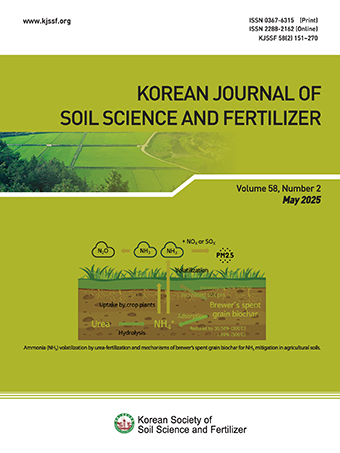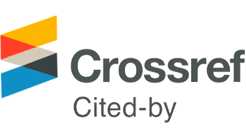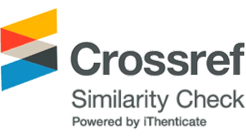Ethical Guidelines
Korean Journal of Soil Science and Fertilizer (KJSSF) follows the Committee on Publication Ethics (COPE) guidelines*
on ethics and malpractice statements.
* https://publicationethics.org/
Authors
All authors must have contributed to the research and therefore authorship should be restricted to those who meet any of the following conditions:
1. Substantial contribution to the conception and design of the study
2. Acquisition, interpretation, and analysis of data
3. Drafting the article or revising it critically for the important intellectual content
Authors have the following ethical obligations to ensure that their work does not compromise the credibility or professionalism of a scientific journal:
1. Authors shall strive to provide an accurate account of the research performed and must avoid fabrication, falsification, and plagiarism.
2. Authors should not submit the same or similar manuscript to any other journals or publication medium while the manuscript is under review with KJSSF.
3. Authors must submit an original manuscript that has not been published elsewhere (in part or in whole) in any form or language unless the new work is an extension of a previous work. In particular, authors should be careful about self-plagiarism (text recycling), salami slicing/publication, etc.
4. Authors should accurately disclose their identity, and ensure that the author group, corresponding author, and author order are all correct when submitting a manuscript.
5. Large Language Models (LLMs), such as ChatGPT, do not currently satisfy our authorship criteria. Notably, an attribution of authorship carries with it accountability for the work, which cannot be effectively applied to LLMs. The use of an LLM should be properly documented in the Methods section (and if a Methods section is not available, in a suitable alternative part) of the manuscript.
Authors must clearly state the following to demonstrate that they have taken care to adhere to ethical and professional standards in conducting the research:
1. Source of funding
All authors must provide the agency and project number (if available) that provided funding to conduct the research.
2. Conflicts of Interest (Financial or Non-Financial)
All authors are asked to inform the Editor-in-Chief of the any actual or potential conflict of interest that may influence their interpretation of the data. Such conflicts may include but are not limited to financial support or personal relationships with other people or organizations, political pressure for interest groups, or academic problems.
3. For research involving experiments on live animals, evidence that it was performed in accordance with relevant ethical guidelines
4. For research involving human beings, evidence that research procedures followed the ethical standards of the Institutional Review Board (IRB) of the authors' institution and the 2000 revision of the Helsinki Declaration of 1975.
All authors of a manuscript are responsible for all aspects of the work, including any failure to meet the above-mentioned provisions or misrepresentations, and agree to ensure that questions regarding the accuracy or integrity of any part of the work are appropriately investigated and resolved. In addition, all authors must approve the final version of the manuscript to be published and are responsible for any withdrawals or corrections.
All authors must be clearly aware that manuscripts that do not comply with the above may be rejected by the editors.
Reviewers
All manuscripts submitted to KJSSF must undergo peer-review (Double-blind), which means receiving expert opinions on a manuscript. Reviewers have the following ethical obligations and must professionally review and comment on the manuscript.
1. Reviewers must not have any conflicts of interest.
2. Reviewers must give unbiased consideration to all manuscripts and judge the manuscript objectively, regardless of the author’s race, religion, nationality, gender, or institutional affiliation.
3. Reviewers must strive to process the manuscript efficiently and in a timely manner.
4. Reviewers must keep the manuscript and the peer review process confidential until the manuscript is published.
Editors and Publishers
The KJSSF’s editors are comprised of experts, and detailed information about the editorial board and editorial office is posted on the website. The ethical obligations of the editors and publishers are as follows:
1. Editors must not have any conflicts of interest and may be excluded from the peer-review process if a competing interest exists.
2. Editors must give unbiased consideration to all manuscripts and judge the manuscript objectively, regardless of the author’s race, religion, nationality, gender, or institutional affiliation.
3. Editors will decide whether the manuscript is to be accepted or rejected based on criteria such as field of study, scope of work, quality of language use, appropriateness of tables and figures, and compliance with format, and will take sole responsibility for this decision. In particular, editors may seek guidance via peer-review, but may reject manuscripts without review if they are deemed inappropriate for the journal.
4. Editors should keep the peer-review process confidential, and make best efforts to process manuscript efficiently and in a timely manner.
Editors and Publishers must comply with the following obligations regarding violations of publishing ethics:
1. Editor and Publishers must not encourage or permit violations of publication ethics.
2. Editor and Publishers must prevent and supervise violations of publishing ethics.
3. When a violation of publishing ethics is suspected, Editors and Publishers must conduct an appropriate investigation to address and resolve the issue in accordance with the COPE’s guidelines.
• If there are any valid concerns following the investigation, the Editors and Publisher should contact the authors and offer the opportunity to resolve the issue.
4. Editors and Publishers are always prepared to address any violations of publishing ethics, and they may revise/amend, express concerns, or withdraw a manuscript or published article as follows:
• If the manuscript is still under review, it may be rejected and returned to the author.
• For already published articles, a revision/amendment or expression of concern may be posted depending on the nature and severity of the violation, and in serious cases, the article may be retracted. In such cases, the reasons will be clearly stated.
• Withdrawal of an article means that the article remains on the platform, but is watermarked “Withdrawn” and an explanation for the withdrawal is provided.
Copyright Policy
All copyright and other intellectual property rights related to the content of the journal are licensed to KSSSF. Hence, a completed “Copyright Transfer Agreement” form should accompany any original material when it is first submitted to KJSSF. Once a manuscript is accepted, KSSSF asserts its copyright and applies it to an open access policy. Articles may be reproduced and distributed only for non-commercial purposes, as detailed in the Creative Commons Attribution-NonCommercial license: http://creativecommons.org/licenses/by-nc/4.0. In other words, through the Creative Commons license, KSSSF allows others to reproduce and distribute the works it publishes, as long as the authors are properly attributed and the content is not plagiarized, misrepresented, or used for commercial purposes. Duplicate publications should not be represented as original publications; rather, KJSSF should be cited as the original site of publication. Apart from these misuses, anyone is free to read, download, copy, share, store, print, search, link, and crawl the full- text of the work.
Open Access
You can publish open access in this journal. Publishing open access means that your article is freely available online as soon as it is published, increasing the visibility, readership and impact of your research. To make your article open access, you will need to pay an article publication charge, which is often covered by your institution or funder. For more information about publication charge, please see the ‘Instructions for Authors’.


 Korean Journal of Soil Science and Fertilizer
Korean Journal of Soil Science and Fertilizer








